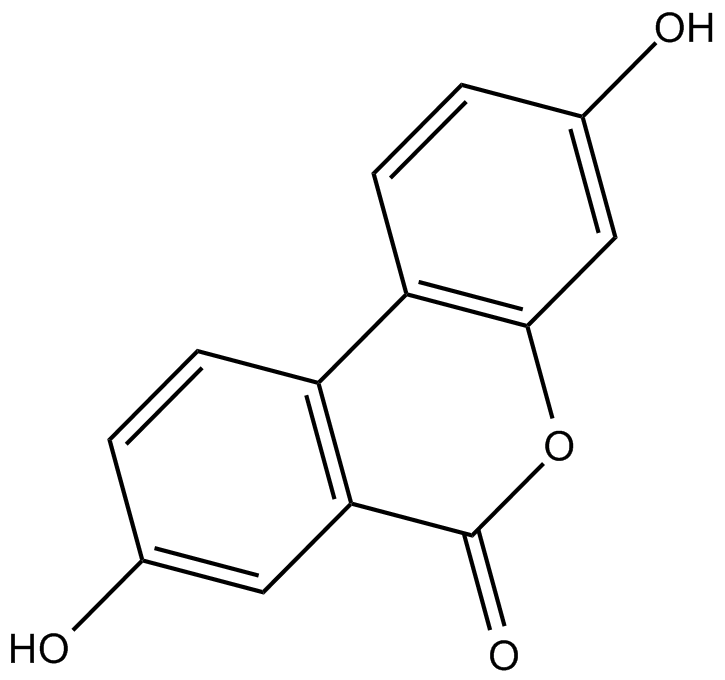Urolithin A (Synonyms: 2',7-Dihydroxy-3,4-benzocoumarin, 3,8-Dihydroxy Urolithin) |
| Katalog-Nr.GC15168 |
Ein Darmmikroben-Metabolit von Ellagsäure.
Products are for research use only. Not for human use. We do not sell to patients.

Cas No.: 1143-70-0
Sample solution is provided at 25 µL, 10mM.
Urolithin A, a gut-microbial metabolite of ellagic acid, exerts anti-inflammatory, antiproliferative, and antioxidant properties. Urolithin A induces autophagy and apoptosis, suppresses cell cycle progression, and inhibits DNA synthesis[1][2].
Micromolar urolithin A concentrations induces both autophagy and apoptosis. Urolithin A suppresses cell cycle progression and inhibited DNA synthesis in human sw620 colorectal cancer cells[2].Urolithin A shows antiproliferative effects and inhibits T24 and Caco-2 cell growth with IC50s of 43.9 and 49 μM, respectively[3].Urolithin A exerts a dose- and time-dependent significant arrest at G2/M and S phases after treatments with 50 and 100 μM at 24 and 48 h compared to control cells. It induces cell apoptosis with 50 and 100 μM [4].Urolithin A shows potent antiproliferative activity on HepG2 cells. When cell death is induced by Urolithin A, the expression of β-catenin, c-Myc and Cyclin D1 are decreased and TCF/LEF transcriptional activation is notably down-regulated. Urolithin A also increases protein expression of p53, p38-MAPK and caspase-3, but suppresses expression of NF-κB p65 and other inflammatory mediators[5].
The volume of paw edema is reduced at 1 h after oral administration of urolithin A. In addition, plasma in treated mice exhibited significant oxygen radical antioxidant capacity (ORAC) scores with high plasma levels of the unconjugated form at 1 h after oral administration of urolithin A[6].
References:
[1]. Gong Z, et al. Urolithin A attenuates memory impairment and neuroinflammation in APP/PS1 mice.
[2]. Wang Y, et al. In vitro antiproliferative and antioxidant effects of urolithin A, the colonic metabolite of ellagic acid, on hepatocellular carcinomas HepG2 cells. Toxicol In Vitro. 2015 Aug;29(5):1107-15.
[3]. Zhao W, et al. Metabolite of ellagitannins, urolithin A induces autophagy and inhibits metastasis in human sw620colorectal cancer cells. Mol Carcinog. 2018 Feb;57(2):193-200.
[4]. Ishimoto H, et al. In vivo anti-inflammatory and antioxidant properties of ellagitannin metabolite urolithin A. Bioorg Med Chem Lett. 2011 Oct 1;21(19):5901-4.
[5]. Qiu Z, et al. In vitro antioxidant and antiproliferative effects of ellagic acid and its colonic metabolite, urolithins, on human bladder cancer T24 cells. Food Chem Toxicol. 2013 Sep;59:428-37.
[6]. González-Sarrías A, et al. Antiproliferative activity of the ellagic acid-derived gut microbiota isourolithin A and comparison with its urolithin A isomer: the role of cell metabolism.Eur J Nutr. 2017 Mar;56(2):831-841.
Average Rating: 5 (Based on Reviews and 3 reference(s) in Google Scholar.)
GLPBIO products are for RESEARCH USE ONLY. Please make sure your review or question is research based.
Required fields are marked with *




